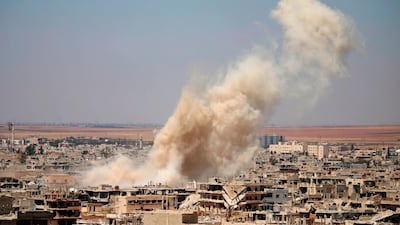Rape, hanging and ill-treatment continue to haunt thousands of survivors of torture as the world marks the International Day in Support of Victims of Abuse on Tuesday.
Doctors without Borders (MSF) revealed they have treated more than 3,000 torture survivors since January 2017, a spokesman told The National.
Although the practice is banned under international law, detainees in Syrian prisons said they have suffered forms of torment and abuse on a daily basis.
MSF has treated about a thousand people this spring, many of them migrants and asylum seekers from Syria, Iran, Iraq, Libya and Afghanistan. The victims suffered shame, depression, incontinence, impotence and miscarriages, and rejection by their families.
United Nations war crime investigators found in March that Syrian government forces and allied militias raped and sexually assaulted women, girls and men in their campaign to punish opposition groups.
Layla has suffered from abuse from the age of 14. She said she “should have been broke like every little girl suffering from violence” but she is resilient.
Layla was detained along with her husband, during her pregnancy.
"They brought my husband and started raping him in front of me," Layla said in testimony provided to The National by MSF. "Then, they raped me in front of him. It was a turning point at our lives,"
The acts are war crimes and crimes against humanity.
Layla gave birth in the prison, lost her husband and found out that her other children were abused in custody.
“I could hear the screams of my little boy as they were raping him, but I couldn’t find my girls. They had tied their mouths so they couldn’t scream.”
The UN's independent investigators have compiled lists of suspects since 2011. They did not name the perpetrators but said they had recorded rape cases by high-ranking officers.
"Some of our patients have been detained in state prisons, and sexually abused. Some have been left hanging for days in small, confined spaces," said MSF. Some victims suffered electric shocks all over their bodies.
______________
Deraa offensive:
Russia carries out first air strikes in south Syria ceasefire zone
Syrian rebels say US tells them it won't intervene in south Syria
Thousands flee as Syrian regime drops napalm and phosphorus on rebel-held south
______________
Layal is now being treated in one of MSF’s centre for victims of torture. The agency warned that torture is more than a physical health matter.
"Torture should be regarded as a sociological and anthropological issue which has consequences on physical health. It creates visible and invisible wounds," said Gianfranco De Maio, MSF medical referent for victims of torture programmes.
Abdul Rahman, who was a law student at Aleppo University, fled Syria after being detained and tortured first by the government, and later by ISIS.
“We were around 60 people in a two-by-two-metre room. They would hang us by one arm and one leg, and prop us up with another object. Then, they would put chlorine on our legs and pierce them with needles,” he said.
People who have been tortured may experience a disconnection from their body, their emotions and their identity, MSF said.
For Abdul Rahman, finding help has given him the opportunity to start over again and to "feel like a human," yet, he said his dreams have been shattered.
"I am in a European country, I thought, which means I should have rights, we were told that Europe is the land of rights. But I haven’t seen any of that," he said.
"We’re only papers here. When my papers are ready, I can move, but until then, they don’t care at all."


